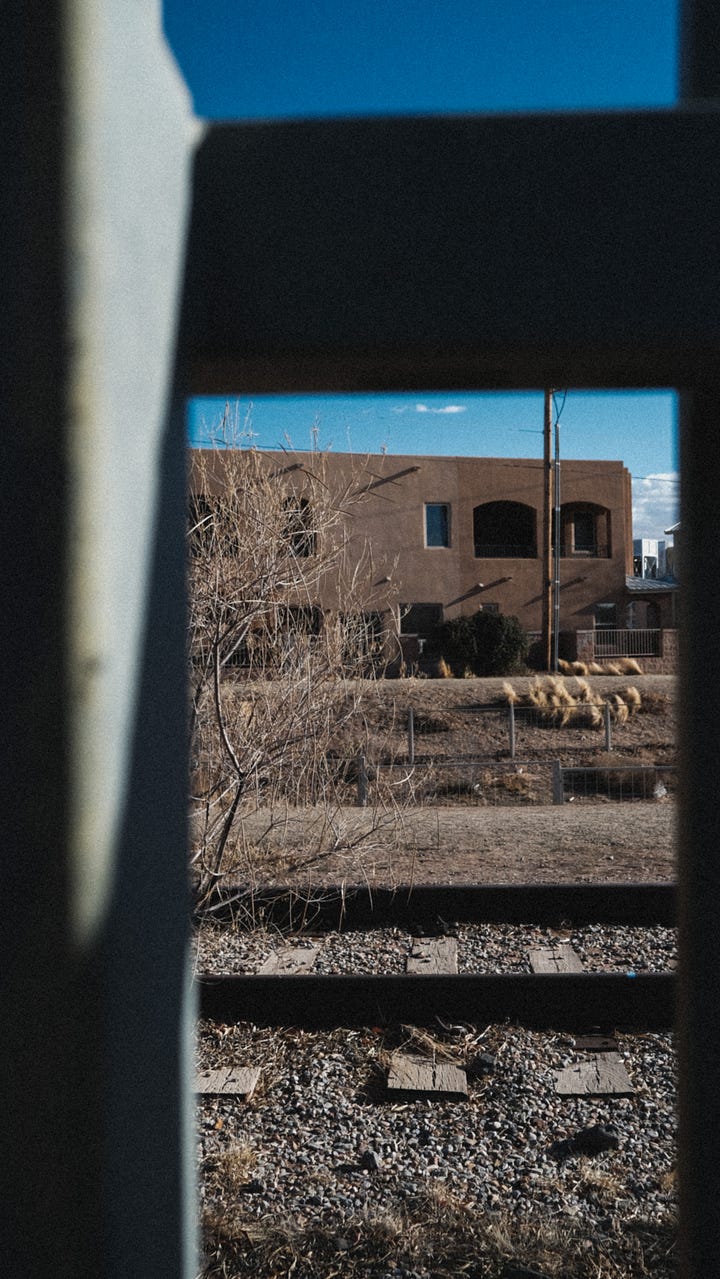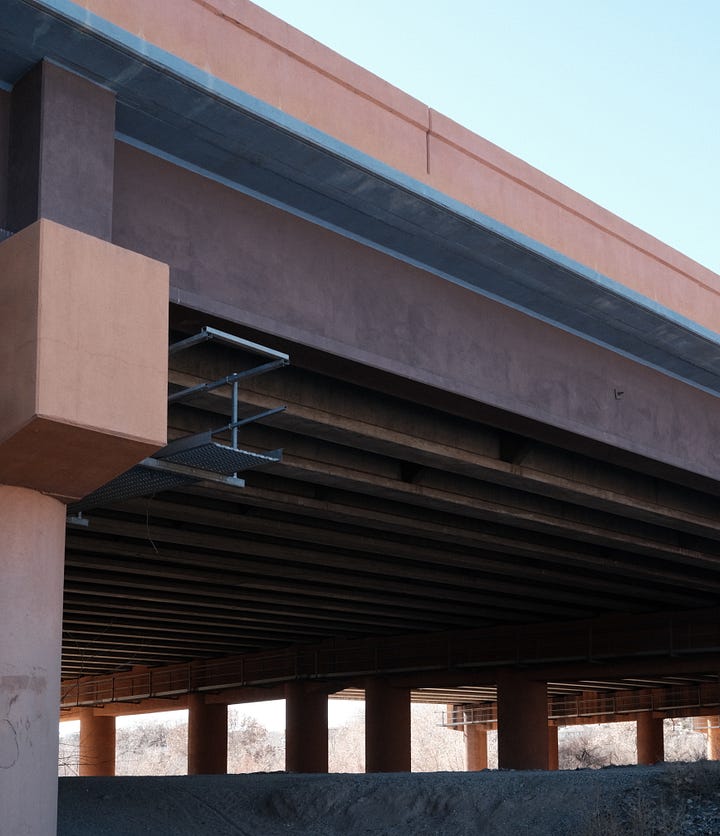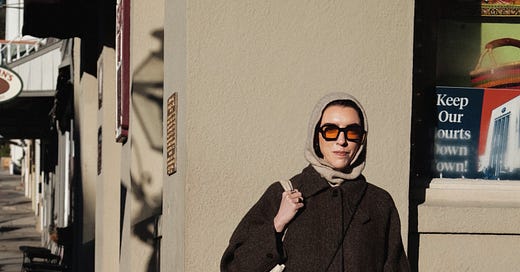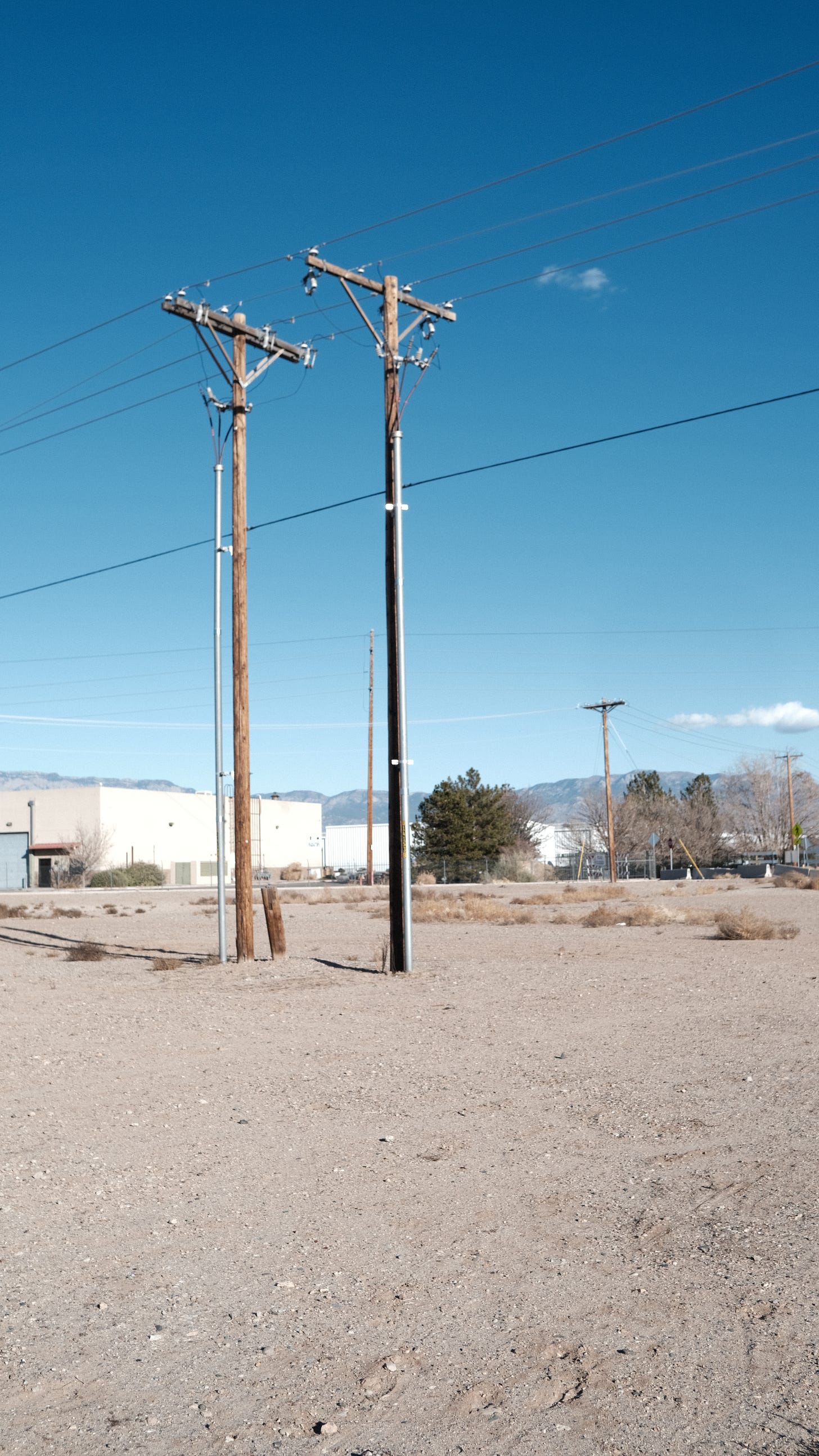what we lose in our assumptions
and what we gain by actually following through on curiosity about clothing and about places
Earlier in the month I tagged along on my partner’s work trip to Boulder, Colorado. I’d never been and was intrigued by it (thanks in no small part to my chat with Stacey last year) and after a holiday season spent mostly at home, I was feeling restless. With my partner working practically around the clock on a design project, I filled each of my four nights there by walking the mile or so from our hotel into downtown, stopping in cafes to warm up and in shops to browse.
On my third night there, having finished the one book I brought with me, I walked into a used book store on Pearl Street to find something new to read. Let’s just say that the owner was a character. The kind of person with whom you struggle to identify any kind of conversational exit. I learned about his life story, his years in Hollywood, his specific ways of categorizing the work of particular writers who straddle the boundary between fiction and nature-writing. As I stood before the register, my book of choosing in his hand and my hand on my wallet, ready to pay, he took note of what I was wearing (essentially the same outfit as below). You’re not from Boulder, he said. I can tell from how you’re dressed.
I’m not! I said, and explained that I was just visiting for the week.
Where from? he asked.
I told him Oakland, California, and held my breath: All week, in response to my Californian-ness, people had been asking me to explain what was happening in Los Angeles, asking about the fires and the smoke, and I would have to detail the vast distance between the Bay Area and our neighbors to the south; describe my heartbreak without owning it too much. It was our collective tragedy but not mine specifically. Yet being elsewhere during it, I felt how easy it is for people to collapse the enormity of California in their minds, how much they wanted me to be their conduit to its suffering.
But the bookstore owner just replied: Oakland! I’ve spent a lot of time there. And told me about how he enjoyed his rides on BART and his walks around the neighborhood he used to visit by the Lake, his admiration of the movie theater and people’s style.
I nodded along, relieved, and made my exit.
Further down the street, on the other side of the Pearl Street Mall, I went into a liquor store, thinking I might find one of those tiny bottles of something for my partner, who had texted me that he’d be working late that night.
Again, the man behind the counter clocked me as from somewhere else.
Where are you visiting from? he asked.
This time, I thought less about my answer, and told him Oakland.
Must be scary, living in Oakland, he said.
Underneath my armor of scarf-coat-sweater-heattech, I felt sweat start to prickle on my skin.
Actually, it’s a really special place, I said to him. It’s my hometown, and there’s a lot to love about it.
As I start to ready my litany—the food, the diversity, my walks through the Rose Garden and up and down Grand Avenue—he shakes his head. I’ve seen the news, he said.
I paid for my little drink—retrospectively, I wish I hadn’t—and left.
To make the obvious obvious, his words were drenched in the kind of racism and ignorance that flows all too readily from our media and from far too many people in power in this country. Because time is a flat circle, we are back in the universe where the president of this country calls cities like Chicago and Baltimore and Oakland war zones and hell holes. There is a lot—a lot—written already about the manifestation of racism both within cities and the way people perceive them (ie The Black Butterfly by Lawrence T. Brown), and if you care about cities and equity and justice it’s all worth seeking out.
What saddened and frustrated me so much about this conversation—alongside the blatant racism—was the absolute lack of curiosity about the place I call home and my experience of it. Culturally, there is a pervasive pressure to prove how much you know; to be correct, always; to not need anyone else. I think we all feel it, to some extent: can you recall a time at a party when someone asked you if you’ve read such and such book, or heard of such and such artist, and even if you haven’t, you’ve said yes? I can. And every time, I’ve wished I could wind back the clock and say: Actually, I don’t—tell me about it. (One of my “resolutions” for last year was to admit when I don’t know something and ask that exact question—just ask more questions in general—and it’s led me down some fascinating conversations). I had hoped, because he grasped the invitation of my outsider-outfit to ask the first question, that he would really want to know about my answer. And I wanted to tell this guy about Oakland and what I love about it, but he didn’t want to hear it. He wanted to be comfortable in his assumption.
When we left Boulder and went down to Albuquerque to meet our little three-month-old niece, I had a lot on my mind about projection versus perception. The widespread story of Albuquerque is one of poverty—which is pervasive—intermixed with Breaking Bad. You could, I suppose, visit there and choose to see only those things (there is, in fact, a Breaking Bad museum).
But when I’m there, I find myself noticing so much. The interplay of shadows, the value of materials and choice details. Nowhere else has such a strong and distinct color palette; the buildings are unabashedly of the place, and the landscape feels ever-present even in the midst of the city.


I’m fortunate to have in-laws there who have consciously made Albuquerque their home, and seeing it through their eyes opened up so much about the city. On the same day, we visited a 60-year-old restaurant specializing in carne adovada and an incredible new bakery, The Witching Flour, on the other side of town. We witnessed an enormous amount of love and care at our niece’s daycare, and learned about efforts to make public higher education essentially free for people in the state. We rode the insanely affordable train between Albuquerque and Santa Fe.
There are the narratives we hear about certain cities, and then there’s how they actually are. One is always more endlessly complex, human, and interesting than the other, and whenever you have an opportunity to grasp it—even if it’s just by asking a visitor how they like living where they do—I encourage you to take it. I suppose this piece is less about style than it is about curiosity. But I do think a good outfit can be an invitation to a conversation. Cities absolutely are too—if we can set aside our assumptions and actually get curious about them.






I was immediately excited to read this hearing that you were in Boulder because I went to school there and live about 60 minutes South now. It’s interesting because I live in an area of the state that tells it’s own stories of Boulder; that it’s for hippies and rich folk, that they are too friendly to homeless individuals and those individuals are ruining the city. But when I go there I am more deeply in touch with the outdoors, I appreciate the niche-ness of its stores, etc. I get sad at the assumptions other people make but I realize I probably miss so much too.
Oh, this piece hits hard. I'm from Singapore, and I can't tell you how many times people (not from Singapore) will immediately respond to that with, "Oh, it's Disneyland with the death penalty" or derisive comments along those lines. It's totally valid to have criticism of a country's human rights record but I can't help but think that people who say that sort of thing out loud to a total stranger aren't thinking about human rights, they just think they are better than the person they're talking to. And like you said, racism and a lack of curiosity is absolutely part of it. Being on the receiving end has definitely made a more curious traveller!